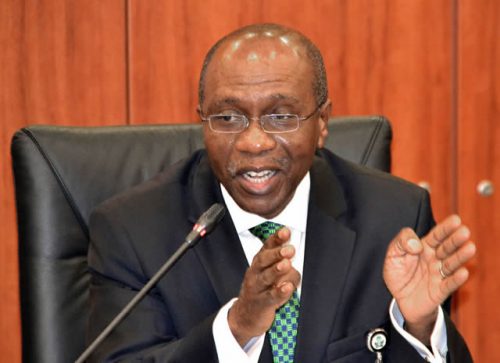The Central Bank of Nigeria, CBN, has ordered Deposit Money Banks and discount houses with huge bad loans and low capital base to stop payment of dividends to shareholders henceforth.
The apex bank, through a circular to the DMBs and discount houses issued on 31st January this year, stated that the measure became imperative in view of the increasingly worrisome trend of the operators rising non-performing loans (NPLs) and the attendant erosion of their capital base.
In the circular signed by its Director, Banking Supervision Department, Ahmad Abdullahi, the CBN stated that it had observed that rather than building up their capital through retaining of earnings, some of the operators were paying out a greater proportion of their profits despite their huge risk profiles.
In order to strengthen the affected banks, the apex bank ordered that any of them with the NPLs above 10 per cent to stop paying dividends for now.
The circular stated: “Globally, retained earnings have been identified as an important source of growing an institution’s capital. Advantages of retained earnings include being a source of long-term finance; being easier and cheaper to raise than external finance; curtailment of financial risks; and improving liquidity and profitability.
“However, it has been observed that rather than take advantage of this beneficial means of capital generation, some institutions pay out a greater proportion of their profits, irrespective of their risk profile and the need to build resilience through adequate capital buffers.”
“In order to facilitate sufficient and adequate capital build up for banks in tandem with their risk appetite, the following directives will now apply. Any Deposit Money Bank or discount house that does not meet the minimum capital adequacy ratio shall not be allowed to pay dividend.
“The DMBs and DHs that have a Composite Risk Rating of ‘High’ or a non-performing loan ratio of above 10 per cent shall not be allowed to pay dividend. The DMBs and DHs that meet the minimum capital adequacy ratio but have a CRR of ‘Above Average’ or an NPL ratio of more than five per cent but less than 10 per cent shall have dividend pay-out ratio of not more than 30 per cent.
“The DMBs and the DHs that have capital adequacy ratios of at least three per cent above the minimum requirement, the CRR of ‘Low’ and the NPL ratio of more than five per cent but less than 10 per cent, shall have dividend pay-out ratio of not more than 75 per cent of profit after tax.”
“There shall be no regulatory restriction on dividend pay-out for the DMBs and the DHs that meet the minimum capital adequacy ratio, have a CRR of ‘Low’ or ‘Moderate’ and an NPL ratio of not more than five per cent. However, it is expected that the boards of such institutions will recommend pay-outs based on effective risk assessment and economic realities.
“No DMB or DH shall be allowed to pay dividend out of reserves. Banks shall submit their board-approved dividend pay-out policy to the CBN before the payment of dividend shall be permitted. All ratios shall be based on financial year averages. This circular takes immediate effect”, the apex bank added.
The current minimum NPL threshold for banks is five per cent, which implies that lenders’ bad loans should not exceed five per cent of their loan books. As at the end of the third quarter of 2017, the banking sector’s NPLs had hit 15.18 per cent
Also in the latest circular, the apex bank also ordered banks and discount houses that did not meet the minimum Capital Adequacy Ratio (CAR) not to pay dividends to their shareholders.
The subsisting CARs as set by the apex bank are 16 per cent for banks it considered to be systemically important; 15 per cent for those with international banking licences; and 10 per cent for others that did not fall into the two categories.






